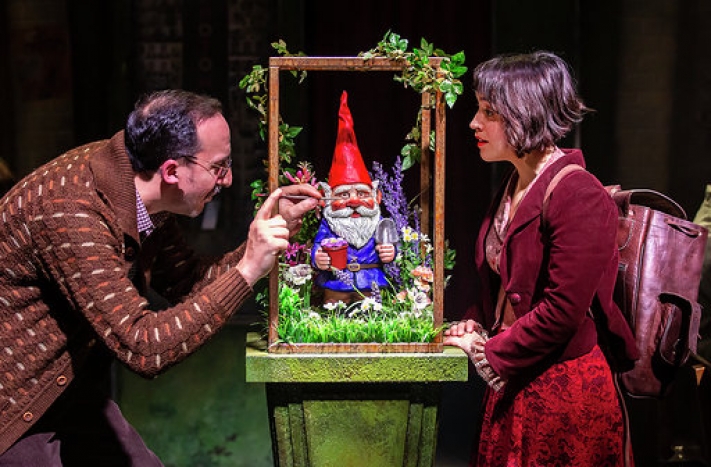Oxford New Theatre, Mon 17th June 2019
Amélie The Musical faithfully follows the plot of the film, told mainly through song. The cast perform the music onstage - all very heavy on strings and accordion, a nice nod to the music of the film. This creates a rich, lively ensemble, who are a joy to watch.
The set was stunning - a stylised metro station, but the clock becomes Amélie’s bedroom, the photo booth becomes a series of doors and a carousel, the two pianos perched there become the bar and tabac of a cafe. The aesthetic and many of the theatrical devices owed a lot to Kneehigh, which lead Audrey Brisson has worked with a lot in the past. The whole effect was visually stunning and did a great job of transforming the magic of the original film into a new form.
While I enjoyed this musical, and it was fun to relive moments of an old classic, I would have liked to have seen it diverge more from the film. There were awkward moments that just needed the close up camera work to come across (like the dropping of a perfume bottle lid) and also some elements that felt dated in a bad way - the word 'spaz', while it is in the film, yes, hits an audience differently 20 years later. The same is true of Amélie grabbing a blind busker to describe all the sights to him that he’s missing - without the context of the original, this comes across as pretty patronising. Where the show diverges from its source material a little and inhabits its new form is where it really shines. I would also have liked a bit more dancing and some more ambitious movement - Brisson has a long background in Cirque du Soleil and Danny Mac is most recently well known for a dance show, so it was a little disappointing not to see a bit more movement from both of them.
The first half of the show was, for me, too faithful to the original and didn’t really work. There were a lot of beats that felt like they were hit for the sake of mimicking the film, but didn’t really transfer to the format of a musical - the entirety of Amélie’s childhood felt like it would have been much better covered in a flashback later in the show rather than as the second number as it left us without a sense of narrative present for a long time. While the show was beautiful to look at, the story seemed to drift, feeling baggy and over-long. The performances also seemed a little off - it felt like the whole thing could have been a lot tighter and more focussed. There were some stand-out moments: the opening and closing numbers of this act were fantastic, and the magic of the set still very much shone through.
The second half, however, came together in a big way. The show loosened up, diverged from the film a bit more and became a lot more fun. There were a couple of riotously surreal numbers involving dancing gnomes and figs which gave a great sense of anarchic fun. We also get to see more of Danny Mac, who gave a truly lovely performance of Nino, and Kate Robson-Stewart’s confident and magnetic performance of Suzanne.
Overall, this is a treat of a show for fans of either the original film or musicals in general. Though there felt to be a couple of missed opportunities in the production, it is a beautiful, rich and magical piece of theatre.




